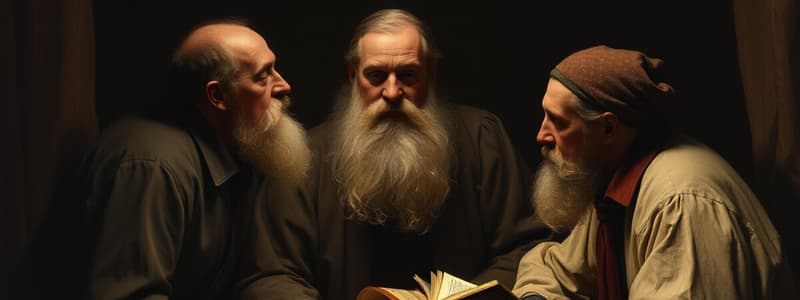Podcast
Questions and Answers
What did Giles Corey say about the sickness he mentioned?
What did Giles Corey say about the sickness he mentioned?
There is hard sickness here, Giles Corey, so please to keep the quiet.
What is Mr. Parris waiting for?
What is Mr. Parris waiting for?
He is waiting for his firewood.
What amount is mentioned as Mr. Parris's salary?
What amount is mentioned as Mr. Parris's salary?
Sixty-six pound.
What change has Giles Corey made regarding his opinion of Mr. Parris?
What change has Giles Corey made regarding his opinion of Mr. Parris?
What does Giles Corey think about the trouble among the people?
What does Giles Corey think about the trouble among the people?
What did John Proctor collect damages for?
What did John Proctor collect damages for?
What does Giles mention about his grandfather?
What does Giles mention about his grandfather?
What does Giles mean when he says someone must fight to drag his oak home?
What does Giles mean when he says someone must fight to drag his oak home?
John Proctor believes in witches.
John Proctor believes in witches.
What did Giles want to ask Mr. Hale?
What did Giles want to ask Mr. Hale?
What did Giles notice about his prayers?
What did Giles notice about his prayers?
What does Giles suspect about his wife's books?
What does Giles suspect about his wife's books?
What did Giles say regarding the Devil and a soul already bad?
What did Giles say regarding the Devil and a soul already bad?
What complaint was made against Martha, Giles's wife?
What complaint was made against Martha, Giles's wife?
Giles Corey believes an honest tailor might go to heaven.
Giles Corey believes an honest tailor might go to heaven.
Flashcards are hidden until you start studying
Study Notes
Giles Corey’s Statements
- Expresses frustration about accusations and challenges the claims that he has spoken ill of others.
- Questions the possibility of supernatural occurrences, highlighting the tension surrounding witchcraft in Salem.
Mr. Parris and Firewood Dispute
- Parris claims his contract allows for six pounds yearly for firewood.
- Conveys discontent about not receiving the wood needed, illustrating his struggles and desperate situation.
Education and Social Standing
- Proctor confronts Parris over his qualifications, revealing Parris’s Harvard education.
- Highlights disparities in social status among characters, questioning Parris's authority.
Change in Perception
- Proctor acknowledges a shift in opinion about Parris, indicating a newfound respect for his character.
- Suggests a deeper connection or alliance is forming amidst community tensions.
Legal Troubles and Distrust
- Discusses pervasive lawsuits in Salem as indicative of underlying societal issues.
- Reflects on personal legal troubles, emphasizing the fractious nature of the community.
Accusations Against Proctor
- Proctor references a past grievance with Corey over accusations of burning property.
- Illustrates the interconnectedness of personal disputes with the larger witch trials context.
Property Claims and Family History
- Corey's recollection of past land disputes highlights bitterness and familial legacies of dishonesty.
- Indicates the importance of property ownership in establishing status and wealth in Salem.
Distrust in Supernatural Claims
- Proctor openly dismisses witchcraft claims, asserting skepticism about the existence of witches.
- Marks a division between believers and non-believers within the community.
Questions on Reading and Knowledge
- Discussion of reading “strange books” indicates a fear of knowledge and its potential consequences.
- Reflects back on personal anxieties related to belief and morality in the face of suspicion.
Impact of Books on Spirituality
- Corey shares experiences of prayer being hindered by his wife's reading, indicating a link between knowledge and piety.
- Represents broader themes of fear over personal faith and its relationship to societal norms.
Accusations Against Corey’s Wife
- Corey defends Martha against witchcraft accusations stemming from livestock failures.
- Emphasizes manipulation and personal vendettas driving the witch trials.
Justice and Consequences
- Corey's lament over the moral implications of honest people facing condemnation underscores the play’s exploration of justice.
- Suggests a critique of the legal system and its failure to protect the innocent.
Final Consequences
- An acknowledgment from Proctor of the Clerk of the Court's role highlights the increasing tensions and eventual outcomes of the trials.
- Reminds audiences of the perilous position of individuals caught in Salem's witch hunt atmosphere.
Studying That Suits You
Use AI to generate personalized quizzes and flashcards to suit your learning preferences.




